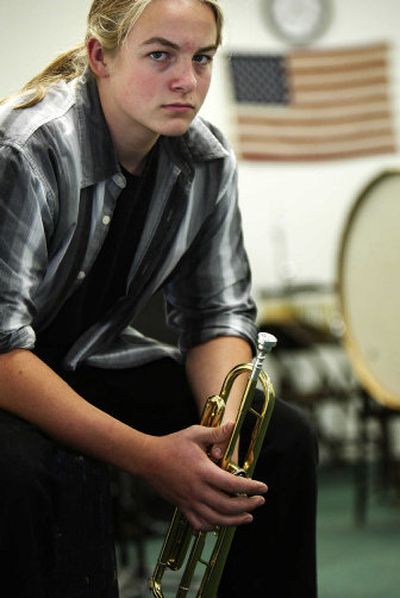Drug test policy hits sour note with some

POTLATCH, Idaho – Ivan Trautman doesn’t want the Troy School District to adopt a drug- and alcohol-testing policy like the one he faces in Potlatch.
“I think it’s wrong, to put it simply,” he said.
Trautman, 15, isn’t allowed to participate in any extracurricular activities at Potlatch High School. He and his mother, Allison Younger, refused to sign a permission slip that would have allowed the school district to randomly test him for drugs and alcohol.
Potlatch Junior-Senior High School requires all students to sign the form in order to participate in any sport or extracurricular activity. Different versions of the policy have been in place in Potlatch since 1999, but it expanded to include all extracurricular activities after a 2002 Supreme Court decision.
Troy School District is in the preliminary stages of developing its own testing policy, similar to the one in Potlatch.
So far, there have been no actions, although Troy High School Principal Brad Malm began researching the policies of districts like Potlatch and Lakeland a few months ago at the request of the school board.
“I think parents and patrons would want to make sure it’s done correctly, and I agree with that,” he said. “It’s got to be a situation where we’re going to take a lot of input and develop a policy from that.
“We know growing up is not an easy process,” Malm added. “If we can give kids another reason to say no, then we’ve done some good.”
Dona Merrell agrees.
“I think it’s a very effective portion of our overall substance-abuse policy,” said Merrell, who is Potlatch’s school nurse as well as the district’s Safe and Drug-Free Schools coordinator.
Only a portion of participating Potlatch students are tested each week. The district tests a random, computer-generated selection of students who are actively participating in extracurricular activities. Between eight to 10 urinalysis tests are administered, then sent to Sterling Reference Laboratories in Tacoma. Each test costs approximately $11 and the total cost of the program is about $1,500 every year, which is paid through grant funding, Merrell said.
Out of concern for students’ medical confidentiality, Merrell declined to say whether any tests had returned positive. If a student does test positive, she said the only people who know are the student, the parents, the building principal, the coach or adviser, and herself.
“This is a nonpunitive policy,” Merrell said. “We would not notify law enforcement; we would notify parents.”
Students who test positive can choose whether to participate in the teen support program. If they do, they will miss only 10 days of their extracurricular activity. If they don’t, they’ll miss 60 days of extracurricular activity, Merrell said.
There is no academic punishment and no out-of-school suspension.
The goal is to identify at-risk students and work with parents to get those students back on track, Merrell said.
Malm said those are the benefits his district is seeking.
“We’re not in the business of trying to catch kids; we’re trying to deter them,” he said.
Some parents, like Younger, don’t believe random testing is the best method to achieve that goal.
“There is no way I would ever sign away my children’s rights,” she said.
Still, Younger knew her son wanted to be involved in school activities, so she went to the Potlatch School Board in December 2005 and tried to advocate on his behalf.
“I was willing to compromise,” she said.
Younger said she supported the Potlatch School Board for being proactive against drug use, but she did not agree with the random selections for the test. She said she would have been willing to sign and allow the testing if the district could prove it had reasonable suspicion her son was using drugs or alcohol.
“I asked the board to work with me to find a way to make both of these things work,” she said. “It was very important that anybody I talked to understood it had nothing to do with drugs. It had to do with his civil rights.”
Instead of reaching a compromise, Trautman was pulled into the principal’s office the next day and told he could not participate in drivers education, band, choir or drama.
Younger said her son had difficulty giving up those activities.
“At least we’re standing up for something that is right,” she said. “But I told Ivan that it has to start with one person.”
A handful of Potlatch parents are continuing to ask questions.
“Every year we have people that are seeking more information about the procedure and the testing itself,” Merrell said.
“They want to make sure they understand how the procedure takes place and how their student is chosen.”
Jack Van Valkenburgh, director of the American Civil Liberties Union of Idaho, said parents ought to know “a lot of these tests aren’t accurate.” The testing policies are legal, though they still haven’t been argued against the Idaho state Constitution, which he said is stronger and more protective of privacy rights.
Van Valkenburgh said the policies are an invasion of privacy because “even though it’s not mandatory, it’s coercive.”
“In order to be a fully participating student, a student must submit to an invasive drug test,” he said. “It’s an unfortunate civics lesson for young people that government doesn’t trust them, that the school doesn’t trust them.”